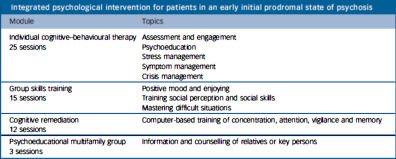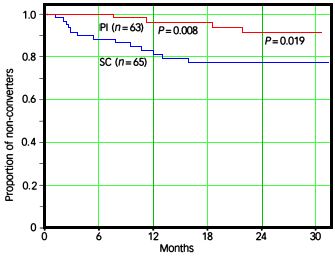When I was reviewing Dr. McGorry’s studies of early interventions in pre-psychotic people I summarized all of the studies done on their Ultra High Risk group [abstracts here]. This study from Germany is different in that they selected their subjects using more subtle criteria [EIPS – early initial prodromal state, having a 19% conversion rate at 1 year and a 70% conversion rate at 5.4 years in a pilot study]. Their thesis is get to the patients even earlier than McGorry. Their intervention is specific [see below]:
Preventing progression to first-episode psychosis in early initial prodromal states
by A. Bechdolf, M. Wagner, S. Ruhrmann, S. Harrigan, V. Putzfeld, R. Pukrop, A. Brockhaus-Dumke, J. Berning, B. Janssen, P. Decker, R. Bottlender, K. Maurer, H.-J. Moller, W. Gaebel, H. Hafner, W. Maier and J. Klosterkotter
The British Journal of Psychiatry. 2012 200:22–29.
Background: Young people with self-experienced cognitive thought and perception deficits (basic symptoms) may present with an early initial prodromal state (EIPS) of psychosis in which most of the disability and neurobiological deficits of schizophrenia have not yet occurred.
Aims: To investigate the effects of an integrated psychological intervention (IPI), combining individual cognitive–behavioural therapy, group skills training, cognitive remediation and multifamily psychoeducation, on the prevention of psychosis in the EIPS.
Method: A randomised controlled, multicentre, parallel group trial of 12 months of IPI v. supportive counselling (trial registration number: NCT00204087). Primary outcome was progression to psychosis at 12- and 24-month follow-up.
Results: A total of 128 help-seeking out-patients in an EIPS were randomised. Integrated psychological intervention was superior to supportive counselling in preventing progression to psychosis at 12-month follow-up (3.2% v. 16.9%; P = 0.008) and at 24-month follow-up (6.3% v. 20.0%; P = 0.019).
Conclusions: Integrated psychological intervention appears effective in delaying the onset of psychosis over a 24-month time period in people in an EIPS.Kaplan–Meier estimates of the rate of progression to subthreshold psychosis in patients assigned to integrated psychological intervention (IPI, n = 63) or supportive counselling (SC, n = 65).
I really liked this multi-center study. Their subjects were help-seeking patients who met the criteria they had studied in advance. The control group had conventional supportive therapy and the treatment group got a combination of cognitive training and social skill training – well formalized by trained therapists [above]. The Kaplan-Meier chart is respectable. They’re obviously working in a clinic setting where care is not determined by an insurance card. Nobody has anything for sale. While this remains a preliminary study, I expect we’ll hear more from them as they refine what they’re doing. The possibility that they will make a dent in the onset of Schizophrenia, or even prevent it is very exciting. There’s no angle in this that I can see anywhere.
This is the kind of clinical research that most of us who came into psychiatry wanted to read about. Drs. Kraepelin and Bleuler would be proud…


Look, Ma! No drugs!
“nobody has anything for sale”
“US Supreme Court upends diagnostics patents
Industry warns ruling may stifle innovation in personalized medicine.”
http://www.nature.com/news/us-supreme-court-upends-diagnostics-patents-1.10270
I read about the prodromal approach about a year and a half ago while reading all my unread issues of Harper’s while in the hospital. The article was sober yet hopeful. Am looking forward to reading more about this